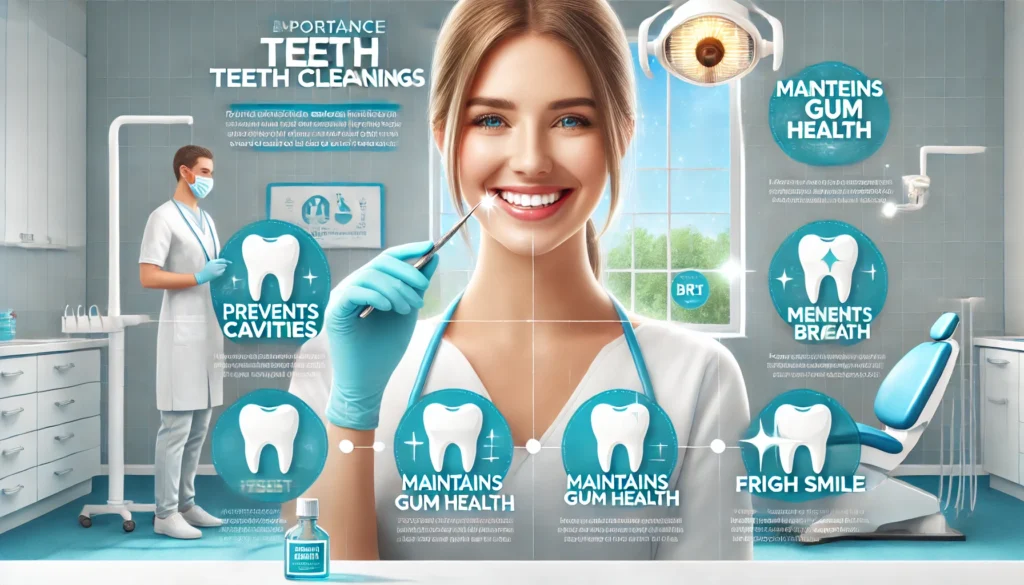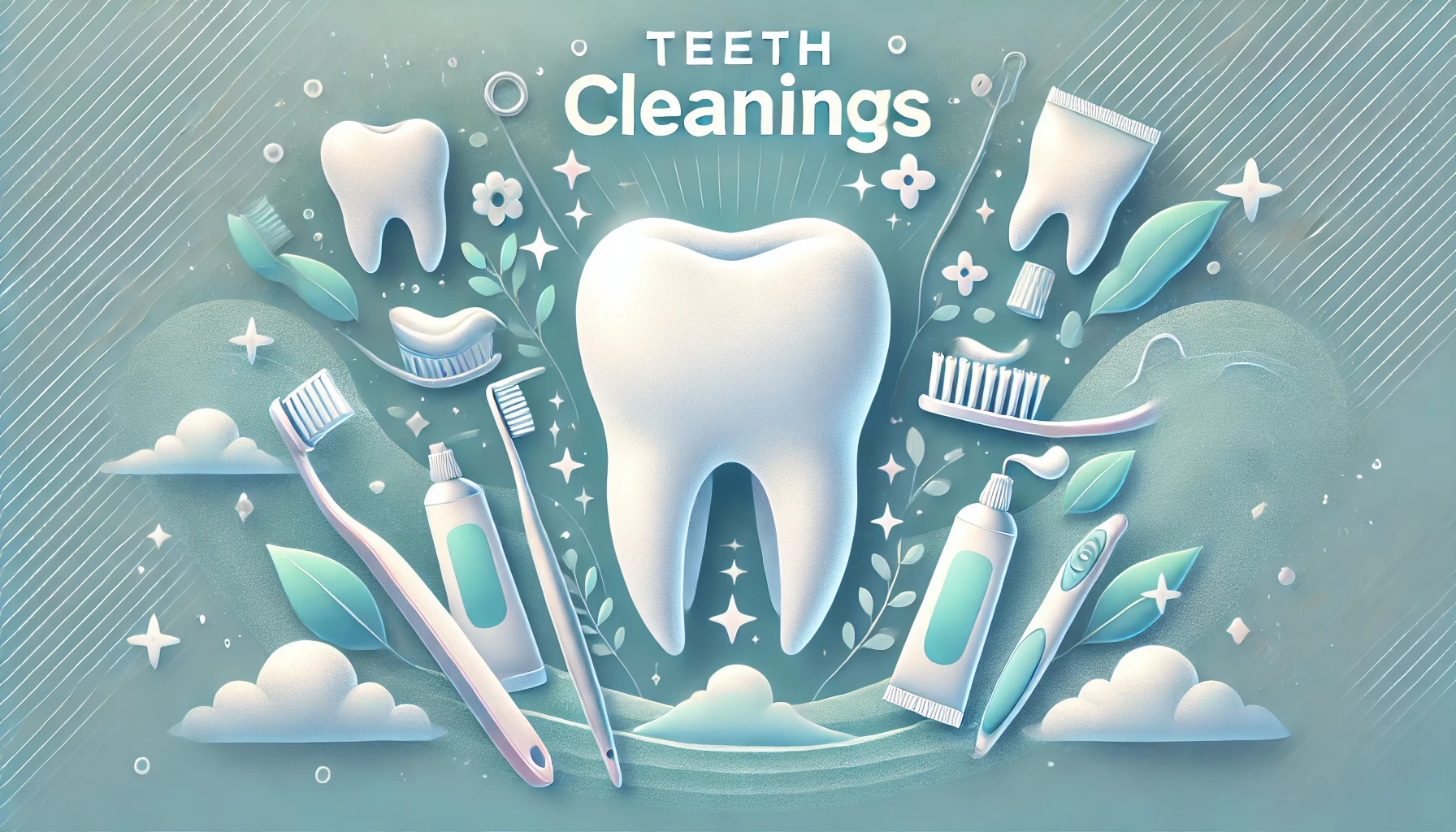Maintaining good oral hygiene is essential for keeping your teeth and gums healthy. While daily brushing and flossing are crucial, they are not enough to prevent all dental problems. Professional teeth cleanings play a critical role in maintaining oral health by removing plaque, preventing cavities, and reducing the risk of gum disease.
Many people underestimate the impact of teeth cleanings on their overall well-being. However, regular dental cleanings not only help you achieve a bright and fresh smile but also contribute to better overall health by reducing the risk of conditions like heart disease and diabetes.
In this comprehensive guide, we’ll explore everything you need to know about teeth cleanings, including their benefits, the procedure, and why they should be a regular part of your healthcare routine.
Why Regular Teeth Cleanings Are Essential

Even with excellent brushing and flossing habits, some areas in your mouth are difficult to clean. Over time, plaque—a sticky film of bacteria—accumulates on the teeth and hardens into tartar, leading to oral health issues.
Professional teeth cleanings provide a deeper clean, helping to prevent problems such as cavities, gum disease, and bad breath. Here’s why regular cleanings are so important:
1. Prevent Cavities and Tooth Decay
Plaque buildup is one of the primary causes of tooth decay. The bacteria in plaque produce acids that erode the enamel, leading to cavities. If left untreated, cavities can cause pain, infections, and even tooth loss. Regular dental cleanings remove plaque and tartar, reducing the risk of decay and ensuring long-term oral health.
2. Reduce the Risk of Gum Disease
Gum disease (gingivitis and periodontitis) is a common yet serious dental problem that can lead to tooth loss if not treated early. The early stage, gingivitis, is characterized by red, swollen gums that may bleed when brushing or flossing. Without intervention, it can progress to periodontitis, causing irreversible damage to the gum tissue and bone.
Regular teeth cleanings help prevent gum disease by removing plaque and tartar buildup around the gum line, keeping your gums healthy.
3. Maintain Fresh Breath
Bad breath (halitosis) can be embarrassing and may be a sign of underlying dental issues. The accumulation of plaque, tartar, and bacteria in the mouth is a leading cause of bad breath. Professional cleanings help eliminate these odor-causing bacteria, leaving your mouth feeling fresh and clean.
4. Detect Dental Issues Early
One of the biggest advantages of regular dental cleanings is early detection. During a cleaning appointment, your dentist will conduct a thorough oral examination to check for signs of cavities, gum disease, or even oral cancer.
Early detection allows for timely treatment, preventing minor issues from turning into serious dental problems that may require expensive and invasive procedures.
5. Protect Your Overall Health
Your oral health is closely linked to your overall health. Research has shown that poor dental hygiene can contribute to various health conditions, including:
- Heart disease – Bacteria from gum infections can enter the bloodstream, increasing the risk of heart disease and stroke.
- Diabetes – Gum disease can make it harder for diabetics to control their blood sugar levels.
- Respiratory infections – Oral bacteria can travel to the lungs, leading to pneumonia and other respiratory conditions.
By prioritizing regular teeth cleanings, you’re not only protecting your smile but also supporting your overall well-being.
What Happens During a Professional Teeth Cleaning?
A professional teeth cleaning is a straightforward procedure performed by a dental hygienist or dentist. Here’s what you can expect during your visit:
1. Oral Examination
Before the cleaning begins, your dentist or hygienist will examine your mouth to check for any signs of decay, gum disease, or other oral health concerns. X-rays may be taken if necessary.
2. Scaling (Plaque and Tartar Removal)
Using specialized tools, the hygienist will remove plaque and tartar buildup from the surface of your teeth and below the gum line. This process is crucial for preventing cavities and gum disease.
3. Polishing and Stain Removal
After scaling, your teeth will be polished using a gritty toothpaste and a high-powered brush. This step helps remove surface stains, leaving your teeth looking brighter and smoother.
4. Flossing and Rinsing
Your hygienist will floss between your teeth to remove any remaining debris. A fluoride rinse may also be provided to help strengthen your enamel.
5. Fluoride Treatment (Optional)
Some patients receive a fluoride treatment to protect against cavities and strengthen their teeth. This is especially beneficial for children and individuals prone to tooth decay.
Also Read: HealthSciencesForumCom Team – Meet the Leaders in Wellness & Medical Insights!
How Often Should You Get a Teeth Cleaning?
The American Dental Association (ADA) recommends getting a professional teeth cleaning every six months. However, some individuals may need more frequent cleanings, especially those with:
- A history of gum disease
- A high risk of cavities
- Orthodontic appliances (such as braces)
- Chronic conditions like diabetes that impact oral health
Your dentist will recommend a cleaning schedule based on your specific needs.
Additional Benefits of Regular Teeth Cleanings
🦷 Prevention of Tooth Loss
Gum disease is a leading cause of tooth loss in adults. By keeping your gums healthy with regular cleanings, you can significantly lower your risk of losing teeth.
😁 Brighter and Whiter Smile
Daily habits like drinking coffee, tea, and red wine can stain your teeth over time. Regular cleanings help remove surface stains, giving you a naturally whiter smile.
💰 Saves Money in the Long Run
Preventive dental care is much more affordable than treating severe dental problems. Investing in regular cleanings can help you avoid costly procedures like fillings, root canals, and gum treatments.
💪 Boosts Self-Confidence
A clean and healthy smile enhances your self-esteem and leaves a positive impression in social and professional settings.
Can Teeth Cleanings Whiten Your Teeth?
While teeth cleanings remove surface stains, they do not provide the same level of whitening as professional teeth whitening treatments. If you want a whiter smile, talk to your dentist about whitening options such as:
- In-office whitening – A fast and effective treatment that brightens your teeth in one visit.
- Take-home whitening kits – Customized trays with professional-grade whitening gel for gradual results.
FAQ’s
1. How long does a professional teeth cleaning take?
A typical professional teeth cleaning takes about 30 to 60 minutes, depending on the level of plaque buildup, tartar accumulation, and overall oral health. If deep cleaning is required, it may take longer.
2. Can teeth cleanings help with sensitive teeth?
Yes! Regular teeth cleanings remove plaque and tartar that contribute to gum recession, which can expose sensitive areas of the teeth. Your dentist may also apply fluoride treatment to strengthen enamel and reduce sensitivity.
3. Do teeth cleanings hurt?
For most people, teeth cleanings are not painful. However, if you have gum disease or sensitive teeth, you may experience mild discomfort. Your dentist can use numbing gels or recommend a gentler cleaning approach if needed.
4. Can I eat after a teeth cleaning?
Yes, you can eat after a teeth cleaning, but it’s best to wait at least 30 minutes if you received a fluoride treatment. Avoid sticky, hard, or acidic foods for a few hours to prevent irritation.
5. What happens if I skip regular teeth cleanings?
Skipping teeth cleanings can lead to plaque buildup, gum disease, bad breath, and an increased risk of cavities. Over time, untreated tartar and bacteria may cause tooth decay, infections, and even tooth loss. Regular cleanings are essential for maintaining good oral health.
Final Thoughts
Regular teeth cleanings are a vital part of maintaining excellent oral health. They help prevent cavities, gum disease, and bad breath while also improving your overall health and confidence. Skipping dental cleanings can lead to serious oral health issues that require expensive treatments. By scheduling your cleanings every six months, you can keep your teeth strong, your gums healthy, and your smile bright. If it’s been a while since your last teeth cleaning, don’t wait any longer—schedule an appointment today and take the first step toward a healthier, happier smile!
Related Post
- Www.Healthsciences Forum .Com – The Ultimate Hub for Healthcare Insights!
- HealthSciencesForumCom Team – Meet the Leaders in Wellness & Medical Insights!
- Hip Pain – Causes, Symptoms, and Effective Treatments!
- Teeth Cleanings – A Complete Overview!
- How Much Protein do I need to Lose Weight & Gain Muscle – A Complete Overview!
